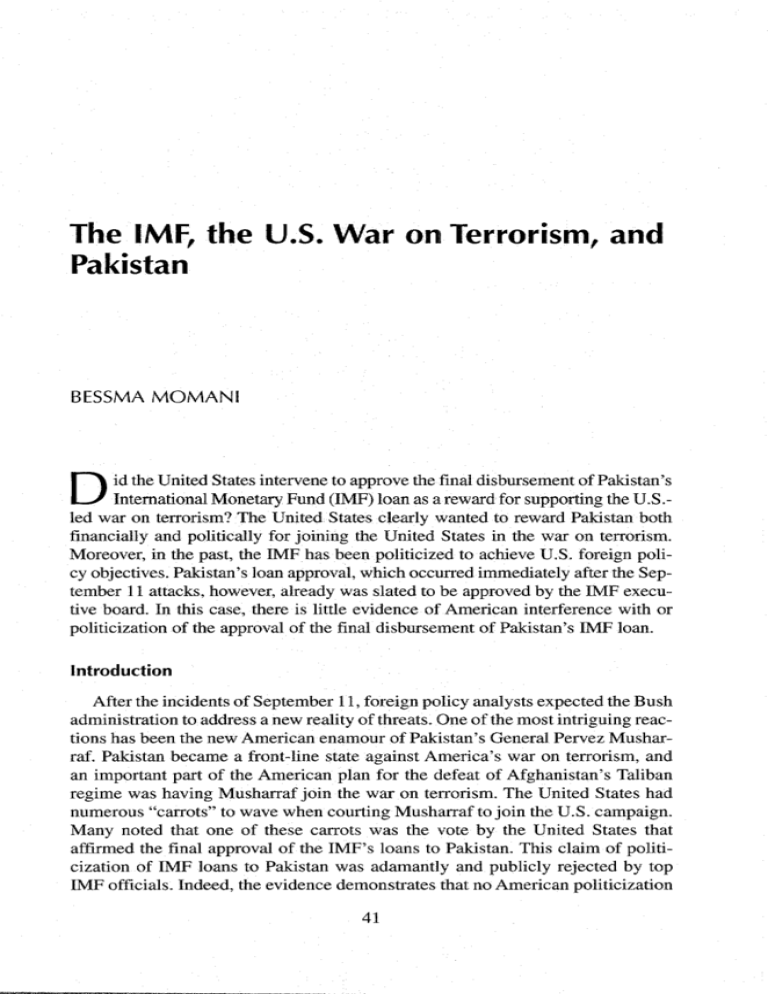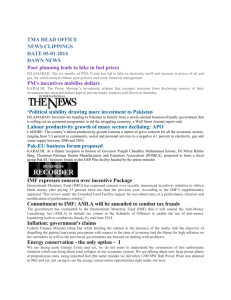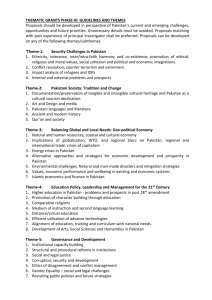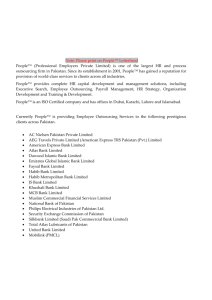
The IMF, the U.S. War on Terrorism, and
Pakistan
BESSMA MOMANI
D
id the United States intervene to approve the final disbursement of Pakistan's
International Monetary Fund (IMF) loan as a reward for supporting the U.S.led war on terrorism? The United States clearly wanted to reward Pakistan both
financially and politically for joining the United States in the war on terrorism.
Moreover, in the past, the IMF has been politicized to achieve U.S. foreign policy objectives. Pakistan's loan approval, which occurred immediately after the September 11 attacks, however, already was slated to be approved by the IMF executive board. In this case, there is little evidence of American interference with or
politicization of the approval of the final disbursement of Pakistan's IMF loan.
Introduction
After the incidents of September 11, foreign policy analysts expected the Bush
administration to address a new reality of threats. One of the most intriguing reactions has been the new American enamour of Pakistan's General Pervez Musharraf. Pakistan became a front-line state against America's war on terrorism, and
an important part of the American plan for the defeat of Afghanistan's Taliban
regime was having Musharraf join the war on terrorism. The United States had
numerous "carrots" to wave when courting Musharraf to join the U.S. campaign.
Many noted that one of these carrots was the vote by the United States that
affirmed the final approval of the IMF's loans to Pakistan. This claim of politicization of IMF loans to Pakistan was adamantly and publicly rejected by top
IMF officials. Indeed, the evidence demonstrates that no American politicization
41
42
Asian Affairs
of Pakistan's loans occurred, as much of the final decisions to disburse the
remaining loan were made prior to September 11. However, I argue that although
only weak evidence of outright politicization and American interference in disbursing the final tranche of funds to Pakistan exists, the United States clearly
wanted to take credit for the approval of Pakistan's loan disbursal. The case of
Pakistan and the war on terrorism provides a lesson in American economic statecraft after September 11.
American Economic Statecraft
After the end of the cold war, the United States relied heavily on economic
instruments of statecraft. The U.S. government, particularly during the Clinton
administration, used economic engagement as its preferred instrument, backed by
America's military and international political strength. In the U.S. war on terrorism, there is renewed debate on what should be the appropriate mix of "carrots
and sticks" in achieving America's foreign policy objectives and national security. Policy analysts suggest the United States extract as much international cooperation on the war on terrorism as possible. I Economic statecraft (also referred to
as economic inducement, economic engagement, economic diplomacy, positive
economic sanctions, and economic appeasement) is an indispensable tool for
facilitating international cooperation. 2 Economic statecraft can be positive, such
as providing foreign aid or promising investment, or negative, such as imposing
sanctions or suspending foreign aid. Economic instruments are useful because
they have more credibility than diplomacy and yet are less costly than military
techniques.' In creating and keeping allies, economic diplomacy is a signal of
good intentions. Economic instruments also are valuable as they can be more easily revoked with changes in political alliances. When allies become less valuable,
for example, decreasing foreign aid is easier than decreasing military exchanges.
Therefore, in the war on terrorism, in which allies can be transient and temporary, the use of economic statecraft is essential.
The Bush administration promised the American public to use all of its tools
in the fight against terrorism. In President George W. Bush's National Security
Strategy document, the United States committed to fostering economic liberalization as a tool toward combating terrorism. This message was intended not only
for the American public but also for an international audience; the Bush administration showed international governments that political and moral support for
the U.S. war on terrorism would result in greater economic exchanges and, consequently, greater economic prosperity for their countries. After the tragic events
of September 11, President Bush stated to the world, "Every nation, in every
region, now has a decision to make. Either you are with us, or you are with the
terrorists." 4 Countries that chose to join the war on terrorism have continued to
reap the economic rewards of their decision.
The IMF, Terrorism, and Pakistan
43
Pakistan's Contribution to the War on Terrorism
History has demonstrated, in the case of Pakistan, that an alliance with the
United States can be perilous. The relationship between Pakistan and the United
States always has depended on the geostrategic value of the region; in other
5
words, the Pakistani-U.S. relationship has failed to be steadfast. Pakistani officials are cognizant of this fact and the Pakistanis have not appreciated being
6
America's "fair-weather friend." Nevertheless, the opportunity for Pakistan to
renew closeness with the United States was sure to result in significant economic dividends for Pakistan. At the same time, this renewed closeness would also
entail significant political challenges and costs for Pakistan.
Pakistani involvement in the U.S. war on terrorism challenged many domestic and regional political interests, including low domestic support for American
military involvement in the region, the threat of a rise in Islamic fundamentalism
reacting to U.S. involvement in the region, and the possibility for political unrest
among Pashtuns who share kinship with the majority of Afghanis. These were
potentially unsettling political consequences for a weak Pakistani regime, such
as Musharraf's, to bear. Similarly, the regional consequences of supporting the
overthrow of the Taliban regime included a strengthened Iran and India. Removing the Taliban and invariably strengthening the political and military position of
the Northern Alliance had the potential to strengthen the Alliance's prime supporters of Iran and India. The regional dynamics of strengthening these other
7
regional powers challenged Pakistan's national interests.
Musharraf claimed that his support for the United States was in the interest of
Pakistan: preserving Pakistan's nuclear program to balance Indian supremacy.
According to third-hand account of events, Musharraf stated:
To safeguard our nuclear program, we must back the United States without reservations .... If we don't support the United States, we ourselves won't survive-nor
will Islam .... It is my responsibility to safeguard our national security. 8I did not
compromise with the United States. It was a matter of Pakistan's survival.
The reasons to join the U.S.-led war in Afghanistan, Musharraf publicly stated, were to protect against an extemal threat (namely India), to preserve Pakistan's nuclear and missile assets, to revive Pakistan's economy, and to promote
the Kashmiri cause. 9
In large part, Pakistan's contribution to the war on terrorism was the help it provided in defeating Afghanistan's Taliban regime. Paldstan contributed tactical and
logistical support for America. Pakistan provided access to strategic military bases
and to Pakistani airspace and provided intelligence. Pakistan also agreed to close
and to secure the Afghan-Pakistani border to stop the infiltration of extremists into
Afghanistan and to trap al Qaeda and Taliban members within Afghanistan. Pakistani authorities arrested and handed over hundreds of individuals who were associated with the Taliban regime, al Qaeda, and other extremist organizations and
44
Asian Affairs
whom the United States wanted to question. Moreover, the Pakistani government
banned extremist religious groups that were on the U.S. list of terrorist organizations. '0 For the United States, the perceived benefit of having the Pakistani regime
on its side was that Pakistan's cooperation further legitimized American geopolitical involvement in the region. It was important that Pakistan was a fellow Muslim and neighboring state and a former ally of Afghanistan. The Bush administration believed Pakistan support of its war on terrorism would signal to the world
that the United States was not an enemy of Islam and Muslim states.
The United States approached the Pakistani regime with offers of numerous
rewards if they joined the U.S. campaign to overthrow the Taliban. One reward
was legitimizing Musharraf's autocratic and military rule, and even Congress
began to praise Musharraf's leadership. Upon Musharraf's visit to the United
States in November 2001, the U.S. House of Representatives introduced a resolution to commend Musharraf's friendship and leadership. The resolution stated
that Musharraf had ". . . taken important steps in cooperation with the United
States in combatting [sic] terrorism; . .. pursued the return of Pakistan to democracy and civil society; . . . [and] shown great fortitude in confronting extremists
in Pakistan.'" Washington gave Musharraf the red-carpet treatment. The United
States also was prepared to give Musharraf tangible economic benefits for joining the U.S.-led coalition.
The United States courted Musharraf with economic rewards. First, the United States removed three different economic sanctions that had been imposed on
Pakistan for testing and acquiring its nuclear arsenal: the Symington Amendment
(imposed in 1978), the Pressler Amendment (1990), and the Glenn Amendment
(1998). The Glen Amendment requires that the U.S. government reject loan applications of countries, such as Pakistan, that are on the U.S. sanction's list. Removing the Glen Amendment sanctions, as well as the other sanctions, allowed the
Bush administration to reward Pakistan handsomely. A congressional bill proclaimed that "the President is authorized, for Pakistan and India, to provide assistance, enter into contracts, take actions in international financial institutions, sell,
lease, or authorize the export of defense articles or defense services, authorize the
export of dual-use items, or extend other financial assistance."" 2 This bill, made
into law, allowed the president to continue dispensing a number of economic
incentives to Pakistan.
Second, the United States promised Pakistan approximately $1.2 billion in
U.S. foreign assistance for 2002-2003, including development aid administered
by the United States Agency for International Development (USAID) and more
than $600 million in cash transfers given directly to the Pakistani government to
pay international debts. The United States also promised military and security aid
for Pakistan to update and modernize its air force (see figure 1). This level of
security and economic foreign assistance from the United States to Pakistan was
the greatest amount of aid given since the end of the cold war.
The IMF, Terrorism, and Pakistan
45
1200
974.2
1000
800
g
600
~~~~~~~~~~~~~~
__
400
200
0
251
62.4
57.5 194
1993 1994 1995
183
46-1
65.6
91.7
1996 1997 1998 1999 2000 2001
2002 2003 2004
Year
0
Security Assistance
M*Economic Assistance
Source. U.S.General Accounting Office (GAO), Centraland SouthwestAsian Countries: Trends in
U.S. Assistance and Key Economic, Goverance, and Demographic Characteristics(Washington DC,
2003): 8.
FIGURE 1. U.S. security and economic assistance to Pakistan.
Third, the United States agreed to reschedule a $379 million bilateral debt
through the Paris Club and to examine initiatives to reschedule other outstanding
bilateral debt. This initial rescheduling lifted the Brooke sanctions imposed on Pakistan by the United States for failing to make its principal and interest payments
on outstanding U.S. loans. The United States also agreed to support rescheduling
Pakistan's $12.5 billion bilateral debt with Paris Club members, of which $2.9 billion was owed to the United States and $5.3 billion was owed to Japan. Pakistan
wanted to reschedule its debt on more generous terms than given previously under
the Houston terms (Paris Club debt repayment on a 15-year-plus term with generous concessional rates and debt swaps). American support of this move could have
proved essential in negotiations with the informal group of creditors. The United
States wields significant influence in the Paris Club and its support for lenient
rescheduling terms for Pakistan could influence other creditors to follow suit.
Fourth, the United States gave Pakistan several trade concessions. The United
States agreed to lower its tariffs and quota restrictions on Pakistani textile goods,
specifically on imports of Pakistani cotton-yarn products. Textiles account for the
top ten Pakistani commodities exported to the United States. The Senate and House
authorized the president to "proclaim such reduction or suspension of any existing
duty on imports of textiles and textile products that are produced or manufactured
Asian Affairs
46
in Pakistan as he determines to be appropriate in response to the threat to national
security posed by intemational terrorism." 13 Removing trade quota restrictions on
Pakistani goods was now deemed to be in the interest of U.S. national security. This
move marked a complete reversal of U.S. trade policy: In 1998, the United States
charged Pakistan with dumping combed cotton-yam exports on its markets and
subsequently took its complaint to the World Trade Organization's Textiles Monitoring Body (TMB). After failing to convince the TMB, the United States continued to impose quota restrictions on these Pakistani goods. Other trade benefits
given to Pakistan included allowing a significant number of duty-free Pakistani
goods to enter the United States under the General System of Preferences (GSP)
program. The GSP applied to $13.5 million in trade.14 In sum, the United States
offered Pakistan numerous economic benefits to join the war on terrorism. However, was the approval of the final disbursement of IMF loans to Pakistan another
of the many U.S. rewards given to Pakistan?
American Favoritism in Disbursing Loans to Pakistan?
On September 26, 2001, the IMF executive board approved the final $135 million disbursement of Pakistan's loan (referred to as a standby arrangement [SBA]),
which was originally signed in November 2000. Journalistic reports argued that
the United States would use its weight on the executive board to approve and to
facilitate the disbursement of Pakistan's loans. After all, it was stated, Pakistan
had proved itself to be an effective coalition partner in the war on terrorism and
the United States signalled it was prepared to reward Pakistan for its efforts. The
Bush administration even tried to take credit for disbursing the final tranche.
State Department spokesperson Richard Boucher stated that, in regard to
approving IMF loans to Pakistan, the U.S. govemment "will be able to support
that and vote for that because we have waived these [U.S.] sanctions. "15 Boucher claimed because Bush removed the Glenn Amendment sanctions imposed on
Pakistan, the United States was able to vote favorably for Pakistan at the executive board meeting. Boucher stated at another press briefing that "[W]e voted for
the release of the $135 million tranche of International Monetary IMF lending."16
Based on Boucher's comments, the Bush administration wanted the world to
know that, indeed, it was Pakistan's benefactor at the IMF.
One of the most interesting suggestions of American favoritism toward Pakistan was Paul Blustein's article in the Washington Post. Blustein wrote:
[A]ccording to a senior IMF staffer, the expectation among some of the people dealing with Pakistan before Sept. 11 was that the chances for board approval were 50-50,
because although the Pakistani govemment had kept many of its pledges, it had failed
to deliver on others, including tax collection. After Sept. 11, the political atmosphere
was transformed-so at Wednesday's meeting, board members representing the
IMF's member countries heaped praise on Islamabad's economic performance.' 7
The IMF, Terrorism, and Pakistan
47
The contents of Blustein's article was circumstantial and anecdotal; however,
as Blustein is considered an insider on IMF affairs, his article was of interest. In
2001, Blustein published The Chastening, a revealing book about the IMF's management of the international economic crises of the 1990s. Moreover, Blustein
based his book on interviews that he conducted with thirty-six IMF staff and management officials. The fact that an insider like Blustein had inferred that the United States intervened to approve Pakistan's loan disbursement commanded IMF
attention. In an unorthodox move, the IMF's director of the External Relations
Department, Thomas C. Dawson, wrote a letter to the Washington Post's editor to
protest Blustein's article. The disbursal of Pakistan's loan had been approved by
the staff prior to September I1, Dawson argued, and "at no time was its approval
a '50-50' proposition.""8 The debate about whether the U.S. interfered in the
approval of disbursing the last tranche of Pakistan's loan is best analyzed by examining the staff reports and by understanding IMF decision-making procedures.
The IMF staff conduct reports after completing missions to IMF member
states. In the case of Pakistan, the two-week staff mission ended August 28, 2001,
and the staff completed its report September 12, 2001. This report was the third
review of Pakistan's November 2000 loan agreement that originally committed
$596 million. Passing the third review would allow Pakistan to receive the final
$135 million tranche. The staff report highlighted Pakistani success in applying
the stringent economic conditions required. The perceived achievements included increased economic growth, reduced inflation, increased competitiveness,
increased official reserves, tight spending controls, a widened tax base, reasonable monetary and exchange rate policies, and liberalization of the energy sector.
The staff report also noted a number of reforms that were not achieved by the
Pakistani authorities, including reforming and privatizing numerous public enterprises, increasing government transparency, increasing private investment,
9
reforming tax collection administration, and abolishing tax exemptions.' Overall, the staff noted that it "believes Pakistan deserves continued support by the
IMF and recommends the granting of the requested waiver and conclusion of the
third review." 20 In IMF terms, this language signaled rubber-stamp approval from
the executive board and a de facto release of funds to Pakistan.
After the staff completes its report, IMF procedures require a formal approval
of the report by the executive board. The board represents the interests of the
IMF's major financial contributors, namely the United States and the G-7 powers. The United States contributes approximately 17 percent of the IMF's liquidity. The executive board officially makes its decisions based on weighted voting
that reflects members' financial contributions. Therefore, the United States holds
17 percent of IMF votes. This vote share does not seem sizable, but it is significant considering a vote of only 15 percent is required to veto many board decisions (excluding loan approvals) and that it is nearly impossible for a natural
21
coalition of votes to oppose the voting power of the United States. In other
48
Asian Affairs
words, it would be difficult to find a large enough coalition of members who do
not share similar interests in advancing economic liberalization to counteract the
power of the United States on the executive board; the United States has de facto
supremacy on the board.
The executive board rarely takes votes, a feature of the board frequently overlooked. Soon after the IMF's inception, the United States instituted a tradition of
not taking formal votes. This consensus-taking was a facade instituted to mask
an illusion of members' equality. In Section C-10 of the IMF's By-laws Rules and
Regulations, the managing director, who officially represents the voice of the IMF
staff at all executive board meetings, is required to "gather the sense of the executive board meeting." 22 The United States and other members do not vote on cases
before the executive board. Votes are not taken, but the managing director is
required to highlight points of contention and agreement. Based on numerous personal interviews with both former and current board members, the managing
director almost always gives American views the utmost attention in summing
the board's opinions.
A number of studies demonstrate American politicization of debtors' loans at
the executive board. 23 The board has politicized loan agreements for geopolitical
reasons in the past, and it is this part of the IMF in which the United States exerts
most of its influence and power. Therefore, it is permissable to assume that Pakistan would receive favorable treatment from the executive board after contributing to America's war on terrorism. Moreover, based on the statements made by
Boucher, the United States clearly wanted to take some credit for Pakistan's loan
approval. Despite Boucher's comments, the United States had not voted and would
not vote on Pakistan's 2000 SBA. The release of two previous tranches of funds
had been discussed at the executive board (in March 2001 and July 2001), and as
has been the precedent, votes were not taken. Pakistan received its two tranches
despite being under the limitations of the Glen Amendment. In addition, the final
disbursement of Pakistan's loan was slated for approval prior to September 11.
If the United States did not actually vote for the IMF loan disbursal and the
loan disbursal was already set to be approved, why did the United States want to
take credit for the loan approval? It is useful to remember the administration's
target audiences: the U.S. public, the Pakistani people, and foreign govemments
and their citizens. First, the Bush administration wanted to show the U.S. public,
and, to a lesser extent, the U.S. legislature, that because Pakistan supported the
United States in the war on terrorism, much was being done to support Pakistan's
economy. The U.S. govemment wanted to demonstrate to the same audience that
it was using all of its bilateral and multilateral instruments in the fight against terrorism. The so-called vote by the United States at the IMF executive board meeting would further demonstrate to America its commitment to tackle terrorism.
Second, the United States took credit for Pakistan's loan approval to convince
sectors of the Pakistani public, particularly the business elite who agree with the
The IMF, Terrorism, and Pakistan
49
"necessary evils" of IMF austerity, that the United States was helpful in ensuring
the long-term economic vitality of their state. Third, the United States wanted to
convince the world, Muslims, and rogue or apathetic states of the benefits of complying with the U.S. war on terrorism. The Bush administration wanted to send
the message that assisting the U.S. war on terrorism would have a positive effect
on countries' negotiations with multilateral institutions and benefit their economic situations. Specifically, an IMF agreement signals an endorsement of a
country's economic policies and potentially ushers in added private investments.
So, although the IMF-Pakistani agreement was a fait accompli, taking credit for
Pakistan's loans got the attention of other debtor states waiting to secure loans or
further tranches of funds from the IMF.
Of course, the IMF, Pakistani officials experienced in IMF negotiations, and
U.S. government officials aware of the board's decision-making procedures were
not fooled by the claim of the United States to have voted in favor of Pakistan's
IMF loan. However, many of the Bush administration's target audiences do not
know IMF procedures; the IMF is, after all, an illusive institution.
Conclusion
In the wake of the tragedies of September 11, foreign analysts expected the
United States to exercise all of its powers to seek retribution. The United States
is accustomed to using economic inducements as a form of statecraft. It was of
no surprise that Pakistan was courted with numerous political and economic
rewards to join the U.S. war on terrorism. The United States claimed it helped
Pakistan pass its final review of the 2000 SBA, unleashing a loan disbursement
of $135 million. The IMF staff report, however, had already approved the final
review of Pakistan's 2000 SBA. Moreover, the United States does not actually
vote on the executive board and did not object to previous disbursements of Pakistan's 2000 SBA. The United States wanted to take credit for approving Pakistan's loan disbursement possibly to show the American public and legislature,
and the world, its commitment to the war on terrorism. Few would dare challenge
U.S. superiority at politicking.
NOTES
1. See Meghan O'Sullivan, Shrewd Sanctions: Statecraft and State Sponsors of Terrorism (Washington, DC: Brookings Institution Press, 2003), 284-318.
2. See Michael Mastanduno, "The Strategy of Economic Engagement: Theory and Practice," in
Economic Interdependence andInternational Conflict: New Perspectiveson an EnduringDebate, ed.
Edward D. Mansfield and Brian M. Pollins (Ann Arbor: University of Michigan Press, 2003).
3. David Baldwin, Economic Statecraft (Princeton: Princeton University Press, 1985), 107.
4. George W. Bush. "Address to a Joint Session of Congress and the American People." September 20, 2001. http://www.whitehouse.gov/news/releases/2001/09/20010920-8.html.
50
Asian Affairs
5. See Dennis Kux, The United States and Pakistan 1947-2000: DisenchantedAllies (Baltimore:
John Hopkins University, 2001).
6. Robert Wirsing, "Precarious Partnership: Pakistan's Response to U.S. Security Policies," Asian
Affairs: An American Review 30, no. 2 (2003), 70.
7. This discussion is based on Christopher Layne, "Offshore Balancing Revisited," The Washington Quarterly 25, no. 2 (2002): 233-248.
8. Based on statements made in Musharraf's meeting with the National Alliance Party President
Ajmal Kbattak. Khattak shared these statements with UPI. United Press International, "U.S. Aim:
Isolate Taliban, Prepare Pakistan," 17 September 2001.
9. President General Pervez Musharraf's speech to the nation on September 19, 2001.
http://www.patriotresource.com/wtc/intl/0919/pakistan.html.
10. This security discussion is based on Alan Kronstadt, Pakistan-U.S. Relations. Congressional
Research Service (3 September 2003): 4-5.
11. U.S. Congress. House. Commending President Pervez Musharrafof Pakistanfor His Leadership and Friendship and Welcoming Him to the United States, 107th Cong., 1st sess. (8 November
2001).
12. U.S. Congress. Senate. To Authorize the Presidentto Provide Assistance to Pakistan and India
through September 30, 2003. 107th Cong., 1st sess. (25 September 2001).
13. Ibid. PakistanEmergency Economic Development and Trade SupportAct. 107th Cong., 1st sess.
(13 November 2001).
14. Based on information from the U.S. Department of State daily press briefing with Richard
Boucher on September 24, 2001. http://www.state.gov/r/pa/prs/dpb/2001.htm.
15. Ibid, September 24, 2001.
16. Based on information from the U.S. Department of State daily press briefing with Richard
Boucher on October 29, 2001. http:H/www.state.gov/r/pa/prs/dpb/2001.htm.
17. Paul Blustein, "A Tighter Hand in Doling Out Global Aid?" Washington Post, 30 September
2001, HO1.
18. Thomas C. Dawson, "A Loan to Pakistan," Letter to the Editor, Washington Post, 4 October
2001, A30.
19. IMF. Pakistan:StaffReport for the Third Review Under the Stand-by Arrangement and Request
for Waiver of Performance Criteria;Staff Statement; and News Brief, IMF Country Report No. 01/178
(October, 2001): 17.
20. IMF. Pakistan: Staff Reportfor the Third Review: 19.
21. David Rapkin and Jonathan Strand, "The United States and Japan in the Bretton Woods Institutions: Sharing or Contesting Leadership?" InternationalJournal 52, no. 2 (1997): 265-296.
22. IMF. By-Laws Rules and Regulations (Washington, DC: Intemational Monetary Fund, 1997), 23.
23. For example, see Tony Killick, IMF Programmes in Developing Countries:Design and Impact
(London: Overseas Development Institute, 1995); and Bessma Momani, "American Politicization of
the International Monetary (IMF)," Review of International Political Economy (Sussex, England:
Routledge, forthcoming).
COPYRIGHT INFORMATION
TITLE: The IMF, the U.S. War on Terrorism, and Pakistan
SOURCE: Asian Aff (NY) 31 no1 Spr 2004
WN: 0410807511004
The magazine publisher is the copyright holder of this article and it
is reproduced with permission. Further reproduction of this article in
violation of the copyright is prohibited.
Copyright 1982-2004 The H.W. Wilson Company.
All rights reserved.








